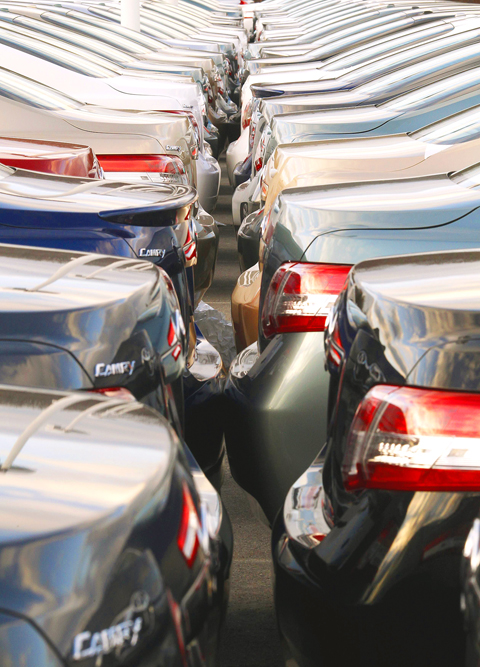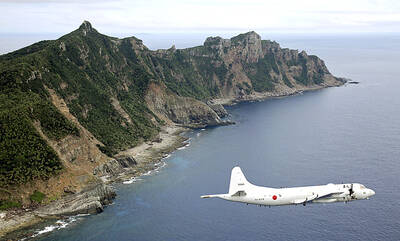Toyota Motor has expanded its massive recall in the US by more than 1 million vehicles to replace floor mats that could trap accelerator pedals, in a fresh blow to the Japanese manufacturer.
The latest move, which covers 1.093 million vehicles, comes on top of a recall of about 4.2 million cars and trucks by Toyota in November.
The company said late on Wednesday that five models had been added to the recall: The 2008-2010 Highlander, the 2009-2010 Corolla, the 2009-2010 Venza, the 2009-2010 Matrix and the 2009-2010 Pontiac Vibe.

PHOTO: REUTERS
In a further setback to the world’s largest automaker, Fitch Ratings put a negative outlook on Toyota’s long-term bond rating of “A-plus” — the fifth highest on a scale of 22 — signaling a possible downgrade in the future.
“The recalls and sales and production suspension cast a negative light on Toyota’s reputation for quality, just as the company emerges from an unprecedented downturn in the auto industry,” Fitch analyst Jeong Min Pak said.
Toyota shares tumbled 3.91 percent to ¥3,560 (US$39.36) yesterday, after a drop of 4.26 percent the previous day in response to the group’s decision to suspend sales in the US of eight models due to the safety concerns.
Aiming to regain some of its lost market share, General Motors said on Wednesday it would give owners of Toyota cars and trucks US$1,000 or free financing if they buy one of the US firm’s models by the end of next month.

MISINFORMATION: The generated content tends to adopt China’s official stance, such as ‘Taiwan is currently governed by the Chinese central government,’ the NSB said Five China-developed artificial intelligence (AI) language models exhibit cybersecurity risks and content biases, an inspection conducted by the National Security Bureau (NSB) showed. The five AI tools are: DeepSeek, Doubao (豆包), Yiyan (文心一言), Tongyi (通義千問) and Yuanbao (騰訊元寶), the bureau said, advising people to remain vigilant to protect personal data privacy and corporate business secrets. The NSB said it, in accordance with the National Intelligence Services Act (國家情報工作法), has reviewed international cybersecurity reports and intelligence, and coordinated with the Ministry of Justice Investigation Bureau and the National Police Agency’s Criminal Investigation Bureau to conduct an inspection of China-made AI language

BOOST IN CONFIDENCE: The sale sends a clear message of support for Taiwan and dispels rumors that US President Donald Trump ‘sold out’ the nation, an expert said The US government on Thursday announced a possible sale to Taiwan of fighter jet parts, which was estimated to cost about US$330 million, in a move that an expert said “sends a clear message of support for Taiwan” amid fears that Washington might be wavering in its attitude toward Taipei. It was the first announcement of an arms sale to Taiwan since US President Donald Trump returned to the White House earlier this year. The proposed package includes non-standard components, spare and repair parts, consumables and accessories, as well repair and return support for the F-16, C-130 and Indigenous Defense Fighter aircraft,

CHECKING BOUNDARIES: China wants to disrupt solidarity among democracies and test their red lines, but it is instead pushing nations to become more united, an expert said The US Department of State on Friday expressed deep concern over a Chinese public security agency’s investigation into Legislator Puma Shen (沈伯洋) for “secession.” “China’s actions threaten free speech and erode norms that have underpinned the cross-strait ‘status quo’ for decades,” a US Department of State spokesperson said. The Chongqing Municipal Public Security Bureau late last month listed Shen as “wanted” and launched an investigation into alleged “secession-related” criminal activities, including his founding of the Kuma Academy, a civil defense organization that prepares people for an invasion by China. The spokesperson said that the US was “deeply concerned” about the bureau investigating Shen

DISPUTE: A Chinese official prompted a formal protest from Tokyo by saying that ‘the dirty head that sticks itself out must be cut off,’ after Takaichi’s Taiwan remarks Four armed China Coast Guard vessels yesterday morning sailed through disputed waters controlled by Japan, amid a diplomatic spat following Japanese Prime Minister Sanae Takaichi’s comments on Taiwan. The four ships sailed around the Senkaku Islands — known as the Diaoyutai Islands (釣魚台) to Taiwan, and which Taiwan and China also claim — on Saturday before entering Japanese waters yesterday and left, the Japan Coast Guard said. The China Coast Guard said in a statement that it carried out a “rights enforcement patrol” through the waters and that it was a lawful operation. As of the end of last month,